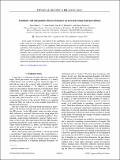Symbiotic and antagonistic disease dynamics on clustered networks using bond percolation
Abstract
In this paper we introduce a description of the equilibrium state of a bond percolation process on random graphs using the exact method of generating functions. This allows us to find the expected size of the giant connected component (GCC) of two sequential bond percolation processes in which the bond occupancy probability of the second process is modulated (increased or decreased) by a node being inside or outside of the GCC created by the first process. In the context of epidemic spreading this amounts to both an antagonistic partial immunity and a synergistic partial coinfection interaction between the two sequential diseases. We examine configuration model networks with tunable clustering. We find that the emergent evolutionary behavior of the second strain is highly dependent on the details of the coupling between the strains. Contact clustering generally reduces the outbreak size of the second strain relative to unclustered topologies; however, positive assortativity induced by clustered contacts inverts this conclusion for highly transmissible disease dynamics.
Citation
Mann , P S , Smith , V A , Mitchell , J B O & Dobson , S A 2021 , ' Symbiotic and antagonistic disease dynamics on clustered networks using bond percolation ' , Physical Review. E, Statistical, nonlinear, and soft matter physics , vol. 104 , no. 2 , 024303 . https://doi.org/10.1103/PhysRevE.104.024303
Publication
Physical Review. E, Statistical, nonlinear, and soft matter physics
Status
Peer reviewed
ISSN
1539-3755Type
Journal article
Collections
Items in the St Andrews Research Repository are protected by copyright, with all rights reserved, unless otherwise indicated.

